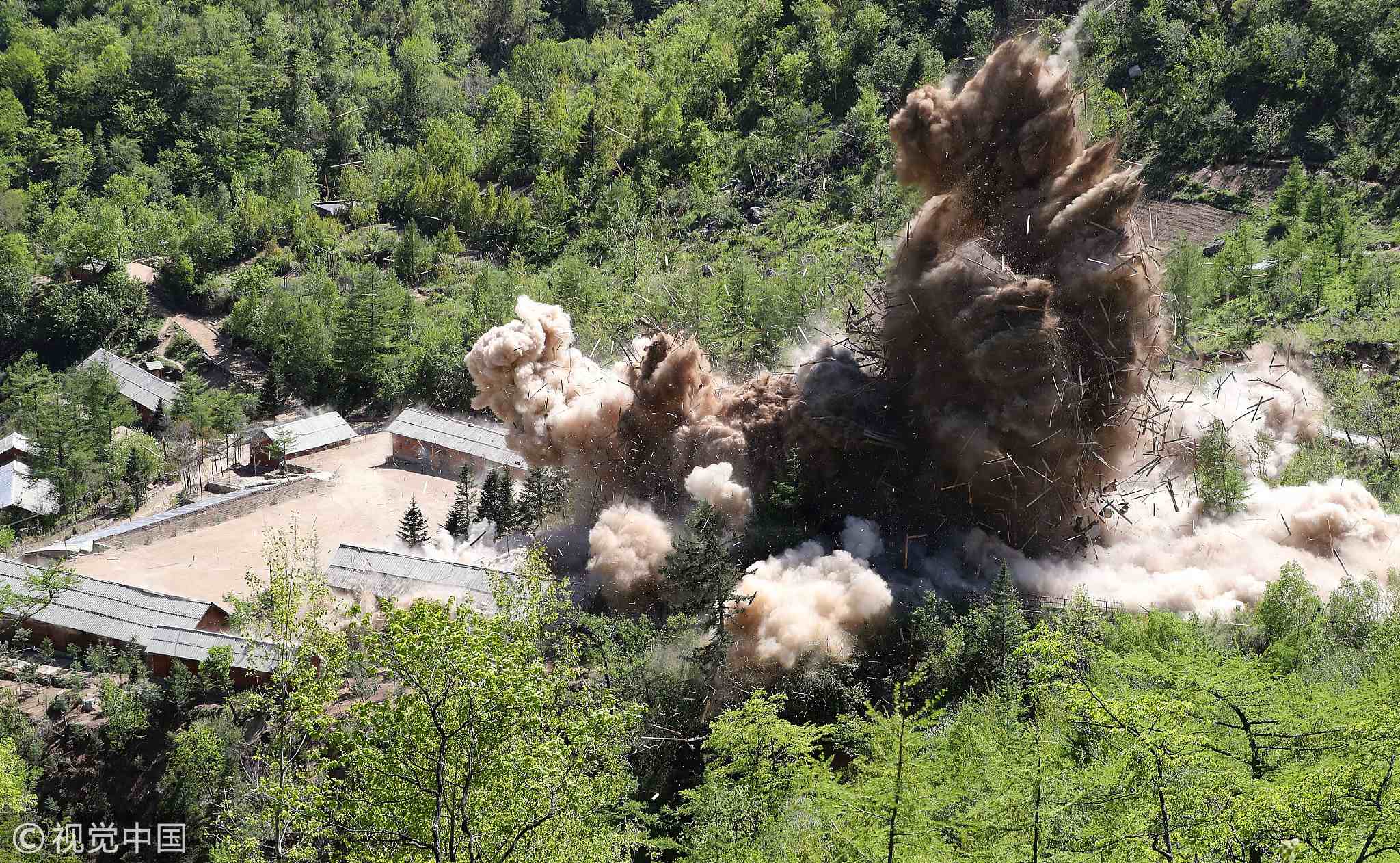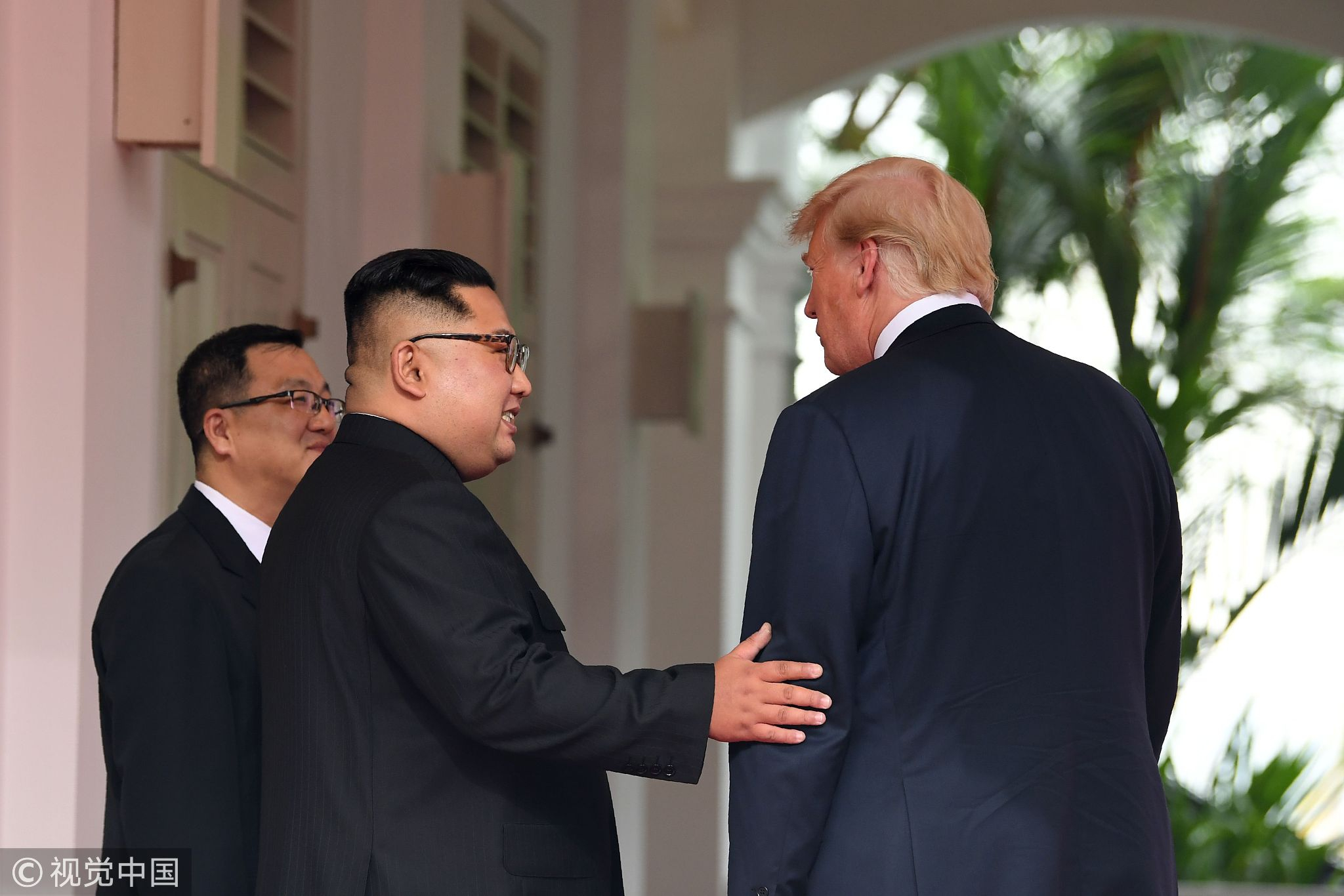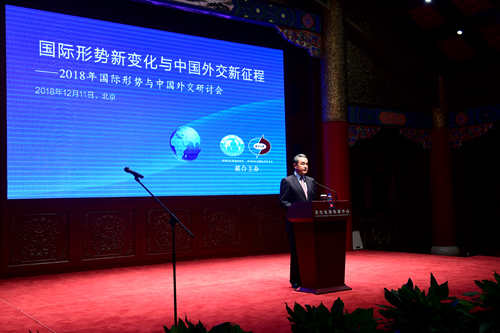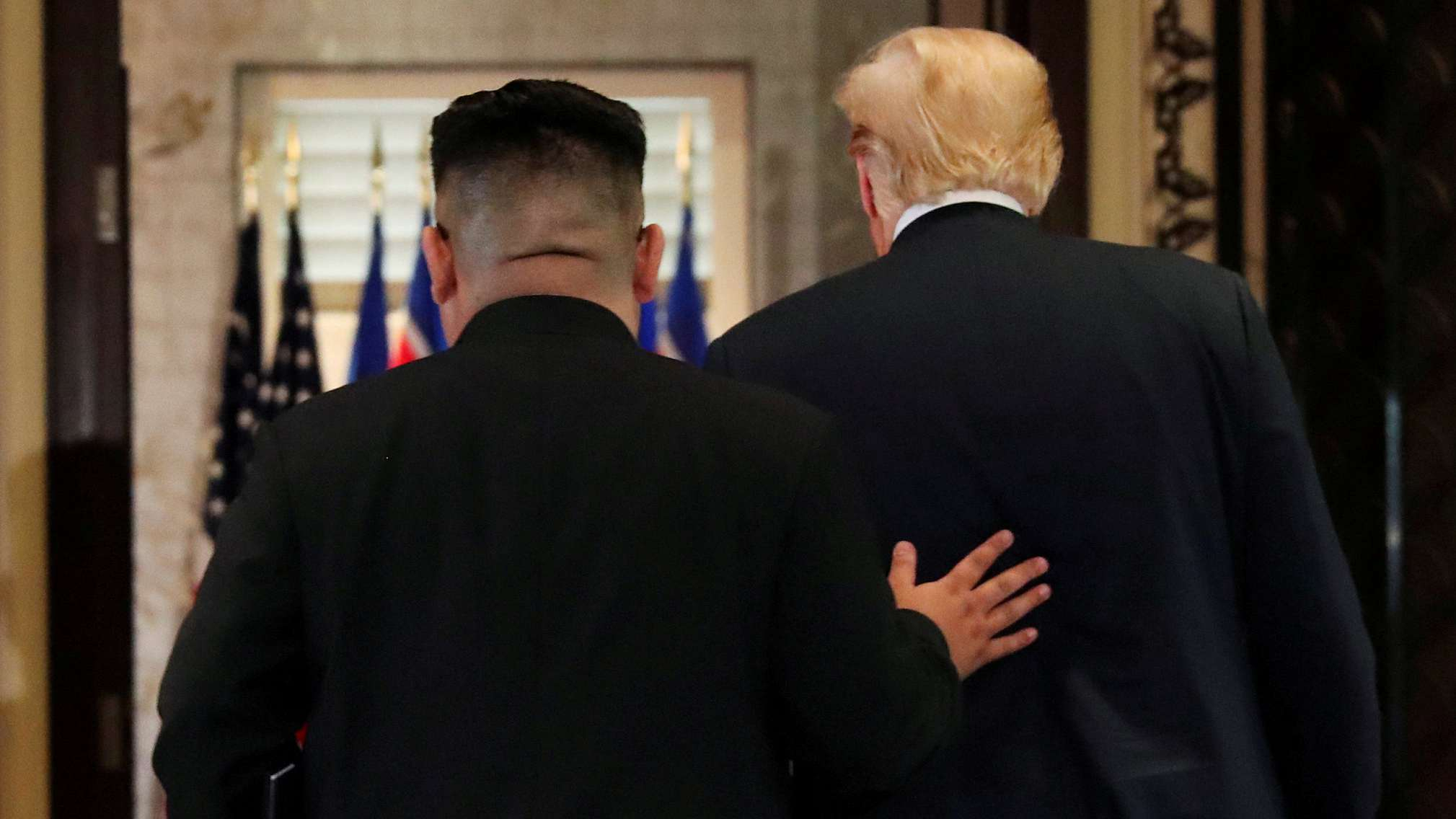"There is no longer a Nuclear Threat from North Korea (the Democratic People's Republic of Korea)," U.S. President Donald Trump tweeted on June 13, a day after his historical meeting in Singapore with DPRK leader Kim Jong Un.
During the Singapore summit, Trump committed to providing security guarantees to the DPRK while Kim reaffirmed his commitment to complete the denuclearization of the Korean Peninsula. Six months on, negotiations have yielded little action and the stalemate in U.S.-DPRK nuclear talks appears to be dragging on.

U.S. President Donald Trump (R) gestures as he meets with DPRK leader Kim Jong Un at the start of their historic summit at the Capella Hotel on Sentosa island in Singapore, June 12, 2018. /VCG Photo
U.S. President Donald Trump (R) gestures as he meets with DPRK leader Kim Jong Un at the start of their historic summit at the Capella Hotel on Sentosa island in Singapore, June 12, 2018. /VCG Photo
Differences between the two sides remain over the scale of denuclearization, U.S. sanctions, and whether to issue a war-ending declaration.
Who will be the first to make the move to break the deadlock? This has always been the sticking point in settling the DPRK nuclear issue.
U.S. wants DPRK disarmed, yet sanctions remain
While the U.S. remains open to talks with the DPRK and amid speculation that a second Trump-Kim summit could take place early next year, the U.S. maintains that sanctions will stay in place until the DPRK takes steps toward denuclearization.
In a statement released shortly after Trump's meeting with Republic of Korea (ROK) President Moon Jae-in during the G20 summit in Argentina, the White House said the two leaders "agreed on the importance of maintaining vigorous enforcement of existing sanctions" against the DPRK.

U.S. President Donald Trump (R) welcomes ROK President Moon Jae-in to their bilateral meeting at the G20 summit in Buenos Aires, Argentina, November 30, 2018. /VCG Photo
U.S. President Donald Trump (R) welcomes ROK President Moon Jae-in to their bilateral meeting at the G20 summit in Buenos Aires, Argentina, November 30, 2018. /VCG Photo
The U.S. has long wanted the DPRK to dismantle its nuclear and missile programs entirely, and negotiators have maintained a hard line on Pyongyang developing nuclear capabilities and weapons, but have failed to secure an agreement even after several high-profile meetings.
Pyongyang has made it clear it has no plans to heed the request, with state media calling the idea "rubbish."
DPRK: No way we will disarm first
"Continued sanctions are deepening our mistrust... Without any trust in the U.S., there will be no confidence in our national security and under such circumstances, there is no way we will unilaterally disarm ourselves first," said DPRK Foreign Minister Ri Yong Ho at the United Nations General Assembly in September.

DPRK Foreign Minister Ri Yong Ho speaks at the 73rd session of the United Nations General Assembly at United Nations headquarters in New York City, September 29, 2018. /VCG Photo
DPRK Foreign Minister Ri Yong Ho speaks at the 73rd session of the United Nations General Assembly at United Nations headquarters in New York City, September 29, 2018. /VCG Photo
The DPRK prefers a step-by-step disarmament process with reciprocal concessions and benefits from the U.S. for each of its denuclearization steps. The ultimate goal of the DPRK is the easing or lifting of U.S.-led international sanctions, the signing of a peace treaty to formally end the Korean War, the establishment of diplomatic ties with the U.S. and the pulling out of U.S. troops in the ROK, experts say.
Kim declared in April that he will suspend the country's nuclear and missile tests. One month later, Pyongyang said it destroyed the Punggye-ri test site.

The Punggye-ri nuclear test site is demolished in Punggye-ri, DPRK, May 24, 2018. /VCG Photo
The Punggye-ri nuclear test site is demolished in Punggye-ri, DPRK, May 24, 2018. /VCG Photo
During September's summit with Moon, Kim agreed to specific denuclearization steps for the first time, including the permanent closure of its Tongchang-ri engine test site and allowing site inspection by experts. The DPRK also promised to dismantle its main Yongbyon nuclear test site permanently if the U.S. abides by the June 12 agreement signed between Kim and Trump.
Who will take the first step?
For the U.S., Trump has been relieved from the pressure to make progress in DPRK nuclear talks following the midterm elections, and is now less motivated to make efforts on the DPRK front, Xinhua News Agency said in an analysis.
For the DPRK, Kim announced in May that the country will shift its focus to economic development and set a five-year plan for it. After that, Pyongyang stopped its missile tests and conducted several high-level meetings with ROK and U.S. leaders, which to some extent, eased the tension on the Korean Peninsula.

DPRK leader Kim Jong Un (C) gestures as he meets with U.S. President Donald Trump (R) at the start of their summit at the Capella Hotel on Sentosa island in Singapore, June 12, 2018. /VCG Photo
DPRK leader Kim Jong Un (C) gestures as he meets with U.S. President Donald Trump (R) at the start of their summit at the Capella Hotel on Sentosa island in Singapore, June 12, 2018. /VCG Photo
However, with sanctions still in place, the DPRK faces difficulties in implementing its economic vision. So it's urgent for the DPRK to strive for progress in nuclear talks with the U.S. in exchange for a better environment for development, said Xinhua.
Trust needs to be built between the two sides
The ROK foreign minister believes that the U.S. should make the first step.
Trust needs to be built between the U.S. and the DPRK and for that to happen the U.S. has to offer something significant, said ROK Foreign Minister Kang Kyung-wha in an interview with The Washington Post in October.
The DPRK has taken a series of positive measures towards denuclearization, but the U.S. failed to ease sanctions in return, which led to the impasse in nuclear talks, wrote Xinhua.
Pyongyang has signaled its frustration with the U.S., with its state media KCNA publishing a commentary in October describing the policy of maintaining sanctions while seeking closer ties as "duplicity and two-faced behavior."
China's stance: Dual-track approach
For decades, China has played an irreplaceable role in advancing the denuclearization process and safeguarding peace and stability on the Korean Peninsula.

Chinese State Councilor and Foreign Minister Wang Yi speaks at the annual symposium on the international situation and China's foreign relations in Beijing, December 11, 2018. /Photo via Chinese Foreign Ministry
Chinese State Councilor and Foreign Minister Wang Yi speaks at the annual symposium on the international situation and China's foreign relations in Beijing, December 11, 2018. /Photo via Chinese Foreign Ministry
"Under the new circumstances, we, committed to preserving the hard-won momentum of de-escalation, encourage the two Koreas to seize the current opportunity to improve relations, and support the U.S. and the DPRK in working together to kick off the process of settling the issue," said Chinese State Councilor and Foreign Minister Wang Yi at the annual symposium on the international situation and China's foreign relations on December 11.
"We will fully honor our international obligations under relevant Security Council resolutions and, at the same time, encourage the U.S., the DPRK and the other parties concerned to move forward through a dual-track approach, so that both the complete denuclearization of the Korean Peninsula and a permanent peace mechanism will be achieved as soon as possible," stressed Wang.








